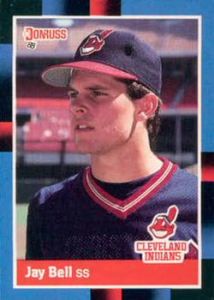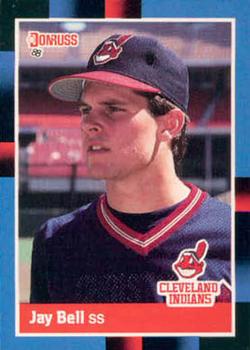September 29, 1986: Cleveland’s Jay Bell homers in his first major-league at-bat
 The 1986 season was winding down, and as far as the Cleveland Indians were concerned, it had been a successful campaign. With only six games left, Cleveland was 80-76 and needed only one win to ensure at least a .500 record. This was no small accomplishment for the Indians, who had finished above the break-even mark only twice in the past 10 seasons.
The 1986 season was winding down, and as far as the Cleveland Indians were concerned, it had been a successful campaign. With only six games left, Cleveland was 80-76 and needed only one win to ensure at least a .500 record. This was no small accomplishment for the Indians, who had finished above the break-even mark only twice in the past 10 seasons.
Cleveland opened a three-game series against the Minnesota Twins at the Hubert H. Humphrey Metrodome on Monday, September 29. It was the Indians’ final stop on their final road trip of the season, a 13-game, four-city swing through the American League West Division. They would conclude the year with a three-game home series against the Seattle Mariners.
But first, it was Minnesota. The Twins (66-89) and Mariners (67-89) were battling it out for sixth place in the AL West. Minnesota appeared headed upward in 1984, when a young Twins team finished 81-81, two seasons after a majors-worst 102 losses. But the Twins had declined to 77-85 in 1985, and now were in danger of finishing in the division cellar. On September 12 Minnesota had fired manager Ray Miller. He was replaced with 37-year-old Tom Kelly, a Twins coach since 1983.
When major-league rosters expanded to 40 players on September 1, many teams had called up players from the minors to get a better look at their prospects. One promising player not called up in the early-September wave, however, was Cleveland’s Jay Bell.
Bell, a shortstop, was the Twins’ number-one pick (eighth overall) from a Florida high school in June 1984. On August 1, 1985, a little over a year after signing his first professional contract with Minnesota, Bell was part of a quartet of prospects dealt to Cleveland for veteran pitcher Bert Blyleven.1 “The Dutchman” was returning to the team where he began his career in 1970.
After his 1986 season ended at Double-A Waterbury, the 20-year-old Bell was sent to the Florida Instructional League for more seasoning – partly to work on his fielding, as he committed 45 errors at Waterbury.
But late-season injuries to second baseman Tony Bernazard (shoulder) and shortstop Julio Franco (ribs) necessitated that a call be made to send Bell to the Tribe.
“Mike Hargrove [Instructional League manager] came over and told me I was going to Cleveland,” said Bell. “It was the farthest thing from my mind. I packed my clothes and went to bed about 2:30 in the morning. It took me at least an hour to go to sleep.”2
On the day Bell joined the big-league club, Cleveland manager Pat Corrales inserted him at second base, batting ninth, for his major-league debut in the series opener at the Metrodome. Not only was Bell’s first big-league game against his original organization, this was the first major-league game he saw in person. Coincidentally, Blyleven was the Twins’ starting pitcher. Blyleven was 15-14 with a 3.99 ERA in 1986 but riding a four-game losing streak.
The 35-year-old right-hander was on the verge of a dubious milestone. He had allowed 46 home runs in 1986, equaling Hall of Famer Robin Roberts’ 1956 major-league record.
Corrales went with Greg Swindell, who had reached the majors in August, just two months after Cleveland selected him second overall from the University of Texas in the June draft. The 21-year-old southpaw was on a four-game win streak, giving him a 4-1 record and 4.05 ERA.
Behind Swindell, Bell handled two grounders in the first inning without incident. Blyleven retired the first eight batters he faced, striking out three. The game was scoreless when Bell batted with two outs in the top of the third.
Bell stepped into the first pitch he saw and blasted a 389-foot home run to left-center field to give the visitors a 1-0 lead.
“I was using [fellow Indians rookie] Cory Snyder’s bat,” said Bell. “I didn’t bring any with me from the Instructional League. When I got to second base, the umpire [Dan Morrison] said he was going to check the bat. I told him he better check Cory’s too because it belonged to him.”3
The home run by Bell sent the writers in the press box scurrying for the record books. Bell was the 55th player in major-league history to hit a home run in his first at-bat and first for Cleveland since Earl Averill on April 16, 1929.4 He was the 11th player to homer on the first pitch thrown.5 It was also the 47th home run off Blyleven that season, breaking Roberts’ big-league record. Blyleven acknowledged his record-breaking feat by good-naturedly doffing his cap.
The Twins came right back in the bottom of the third. Greg Gagne led off with a double to left field. Alvaro Espinoza followed with a single to right field, and Gagne checked in at third base.
After Swindell came back to strike out Mark Davidson, Mickey Hatcher followed with a sacrifice fly to left field, scoring Gagne and tying the game at 1-1.
Kirby Puckett, batting .329 in a breakout season,6 hit a groundball to third, but Brook Jacoby muffed it for an error. Espinoza moved up to second, then scored on a single by Gary Gaetti. The unearned run left the Indians trailing, 2-1.
In the fourth, Cleveland’s Dave Clark – a rookie called up from Triple A at the beginning of September – led off with a walk. Joe Carter followed with his 28th round-tripper and the Indians regained the lead, 3-2.
Again, the Twins came storming back in their half of the inning, capitalizing on the Indians’ porous defense for two runs. With one down, Billy Beane singled to center. One out later, Espinoza singled to center.
But Brett Butler misplayed the hit and Beane scored from first base. Espinoza ended up at third on the error. Davidson then hit a grounder to second base that Bell could not handle, and Espinoza came home, giving Minnesota its third unearned run of the game.
The Twins led 4-3 until the top of the seventh. Mel Hall doubled to left field to lead off the inning. Consecutive groundouts by Snyder and Pat Tabler plated Hall and tied the score, 4-4. An inning later, Cleveland grabbed the lead when Butler connected for his fourth home run of the season.
In the bottom of the eighth, Swindell gave up back-to-back singles to Puckett and Gaetti to put runners at the corners. Corrales went to his bullpen and signaled for reliever Doug Jones, a 29-year-old right-hander who had earned a September call-up with outstanding work at Double A and Triple A.7
Puckett came home on a sacrifice fly to left off the bat of Tom Brunansky. Gaetti moved up to second base. Kelly inserted pinch-hitter Mark Salas for Tim Laudner. Salas flied out to right. Kelly went to his bench again, this time calling on Randy Bush to pinch-hit for Beane. This time the maneuver worked as Bush singled Gaetti home with the go-ahead run.
With the Twins taking a one-run lead to the ninth, Kelly brought in right-hander Mark Portugal, who gave up a one-out double to Snyder. Corrales inserted pinch-runner Otis Nixon for Snyder. But the Indians could not bring Nixon across, as Portugal retired Tabler and Jacoby on fly balls to secure his first big-league save.
Blyleven (16-14, 4.04 ERA) was credited with the win. He gave up five runs, all earned, struck out nine, and walked one. Cleveland’s three home runs pushed his season total to 49, three more than Roberts’ previous record.
Blyleven gave up another home run on October 4, the final day of the regular season. As of 2023, Blyleven’s 50 homers allowed in a season remain the major-league record. Of those, 31 were hit at the Metrodome. “Bert Blyleven is probably pitching in the worst home run park ever built,” said Roberts. 8
Of all the homers against Blyleven in 1986, it is unlikely that any meant more to the hitter as Bell’s first-appearance blast.
“I enjoyed it,” said Bell. “It was definitely a thrill hitting it against Blyleven. It’s so ironic because I was traded for him.”9
Blyleven, who won 287 games over 22 seasons and was inducted into the National Baseball Hall of Fame in 2011, was asked what kind of a pitch he threw to Bell.
“It was a high knuckleball,” said Blyleven. “It’s a new pitch I’ve been working on. Really, it was a fastball. I thought I made a good pitch.”10
Swindell (4-2, 4.02 ERA) was the hard-luck loser, surrendering six runs, three earned. He struck out six and walked none.
Cleveland finished at 84-78, clinching a winning record by beating the Mariners at home on October 2. The Indians were fifth in the AL East Division, 11½ games behind the first-place Boston Red Sox. Minnesota came in sixth in the AL West with a 71-91 record, 21 games behind the California Angels.11
In 1989 Bell was traded to the Pittsburgh Pirates. He carved out a nice career for himself in the National League, winning a Gold Glove in 1993 and appearing in two All-Star Games. He was a member of the Arizona Diamondbacks’ World Series winners in 2001 – where his teammates included Swindell, 15 years after they debuted with the ’86 Indians.
Acknowledgments
This article was fact-checked by Stew Thornley and copy-edited by Len Levin.
Sources
In addition to the game story and box-score sources cited in the Notes, the author consulted the Baseball-Reference.com and Retrosheet.org websites.
https://www.retrosheet.org/boxesetc/1986/B09290MIN1986.htm
https://www.baseball-reference.com/boxes/MIN/MIN198609290.shtml
Notes
1 Jay Bell was sent to Cleveland along with pitcher Curt Wardle and Jim Weaver on August 1, 1985. Pitcher Rich Yett was added as a player to be named later on September 17.
2 Paul Hoynes, “Bell Gets Tribe Call,” Cleveland Plain Dealer, September 30, 1986: C-3.
3 Paul Hoynes, “Tribe Hits 3 Homers, but Falls to Twins,” Cleveland Plain Dealer, September 30, 1086: C-1.
4 “Tribe Hits 3 Homers, but Falls to Twins.” Averill’s blast came on a 0-and-2 count against Detroit’s Earl Whitehill
5 “Tribe Hits 3 Homers, But Falls to Twins.”
6 The 26-year-old Puckett hit .328 in 1986, third best in the AL. He was selected for the first of 10 career All-Star Games, and received his first of six Silver Slugger and six Gold Glove Awards.
7 Jones’s call-up in September 1986 was his first major-league action since he debuted with four appearances with the Milwaukee Brewers in 1982. With his career rejuvenated, Jones appeared in 846 big-league games over 16 seasons, recording 303 saves.
8 “Bert Sets HR Mark in Style,” St. Cloud (Minnesota) Times, October 30, 1986: 1C.
9 “Tribe Hits 3 Homers, but Falls to Twins.”
10 “Tribe Hits 3 Homers, but Falls to Twins.”
11 Minnesota made a remarkable turnaround in 1987 under Tom Kelly. The Twins won the AL pennant and beat the St. Louis Cardinals in the World Series. It was the first World Series Championship for the Twins since they relocated from Washington in 1961.
Additional Stats
Minnesota Twins 6
Cleveland Indians 5
Hubert H. Humphrey Metrodome
Minneapolis, MN
Box Score + PBP:
Corrections? Additions?
If you can help us improve this game story, contact us.


